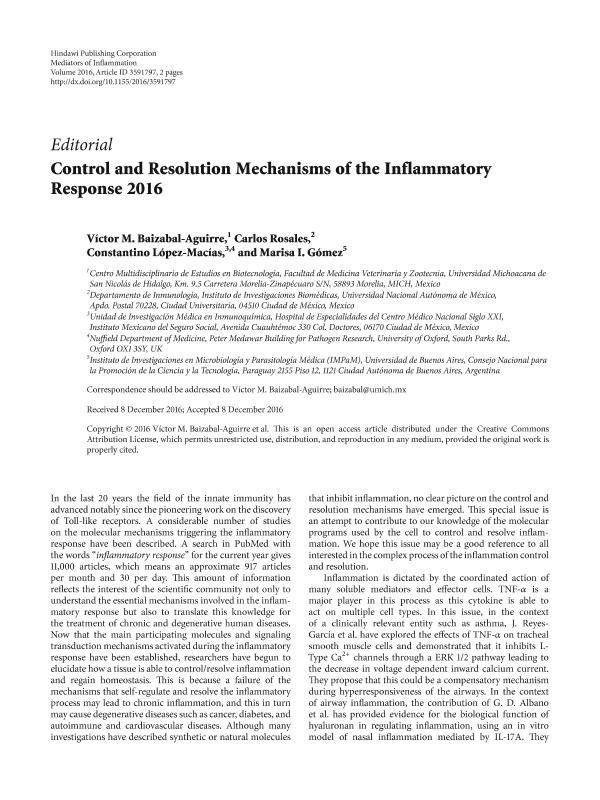Mostrar el registro sencillo del ítem
dc.contributor.author
Baizabal Aguirre, Víctor M.
dc.contributor.author
Rosales, Carlos
dc.contributor.author
López Macías, Constantino
dc.contributor.author
Gomez, Marisa Ines

dc.date.available
2018-06-06T18:59:09Z
dc.date.issued
2016-12
dc.identifier.citation
Baizabal Aguirre, Víctor M.; Rosales, Carlos; López Macías, Constantino; Gomez, Marisa Ines; Control and Resolution Mechanisms of the Inflammatory Response 2016; Hindawi Publishing Corporation; Mediators of Inflammation; 2016; 12-2016; 1-2
dc.identifier.issn
0962-9351
dc.identifier.uri
http://hdl.handle.net/11336/47533
dc.description.abstract
In the last 20 years the field of the innate immunity has advanced notably since the pioneering work on the discovery of Toll-like receptors. A considerable number of studies on the molecular mechanisms triggering the inflammatory response have been described. A search in PubMed with the words ?inflammatory response? for the current year gives 11,000 articles, which means an approximate 917 articles per month and 30 per day. This amount of information reflects the interest of the scientific community not only to understand the essential mechanisms involved in the inflammatory response but also to translate this knowledge for the treatment of chronic and degenerative human diseases. Now that the main participating molecules and signaling transduction mechanisms activated during the inflammatory response have been established, researchers have begun to elucidate how a tissue is able to control/resolve inflammation and regain homeostasis. This is because a failure of the mechanisms that self-regulate and resolve the inflammatory process may lead to chronic inflammation, and this in turn may cause degenerative diseases such as cancer, diabetes, and autoimmune and cardiovascular diseases. Although many investigations have described synthetic or natural molecules that inhibit inflammation, no clear picture on the control and resolution mechanisms have emerged. This special issue is an attempt to contribute to our knowledge of the molecular programs used by the cell to control and resolve inflammation. We hope this issue may be a good reference to all interested in the complex process of the inflammation control and resolution.
dc.format
application/pdf
dc.language.iso
eng
dc.publisher
Hindawi Publishing Corporation

dc.rights
info:eu-repo/semantics/openAccess
dc.rights.uri
https://creativecommons.org/licenses/by-nc-sa/2.5/ar/
dc.subject
Inflammation
dc.subject
Cytokines
dc.subject
Anti-Inflammatory
dc.subject
Therapy
dc.subject.classification
Salud Ocupacional

dc.subject.classification
Ciencias de la Salud

dc.subject.classification
CIENCIAS MÉDICAS Y DE LA SALUD

dc.title
Control and Resolution Mechanisms of the Inflammatory Response 2016
dc.type
info:eu-repo/semantics/article
dc.type
info:ar-repo/semantics/artículo
dc.type
info:eu-repo/semantics/publishedVersion
dc.date.updated
2018-06-06T13:37:20Z
dc.journal.volume
2016
dc.journal.pagination
1-2
dc.journal.pais
Estados Unidos

dc.journal.ciudad
Sylvania
dc.description.fil
Fil: Baizabal Aguirre, Víctor M.. Universidad Michoacana de San Nicolás de Hidalgo; México
dc.description.fil
Fil: Rosales, Carlos. Universidad Nacional Autónoma de México; México
dc.description.fil
Fil: López Macías, Constantino. Instituto Mexicano del Seguro Social; México. University of Oxford; Reino Unido
dc.description.fil
Fil: Gomez, Marisa Ines. Consejo Nacional de Investigaciones Científicas y Técnicas. Oficina de Coordinación Administrativa Houssay. Instituto de Investigaciones en Microbiología y Parasitología Médica. Universidad de Buenos Aires. Facultad de Medicina. Instituto de Investigaciones en Microbiología y Parasitología Médica; Argentina
dc.journal.title
Mediators of Inflammation

dc.relation.alternativeid
info:eu-repo/semantics/altIdentifier/doi/https://dx.doi.org/10.1155/2016/3591797
dc.relation.alternativeid
info:eu-repo/semantics/altIdentifier/url/https://www.hindawi.com/journals/mi/2016/3591797/
Archivos asociados
